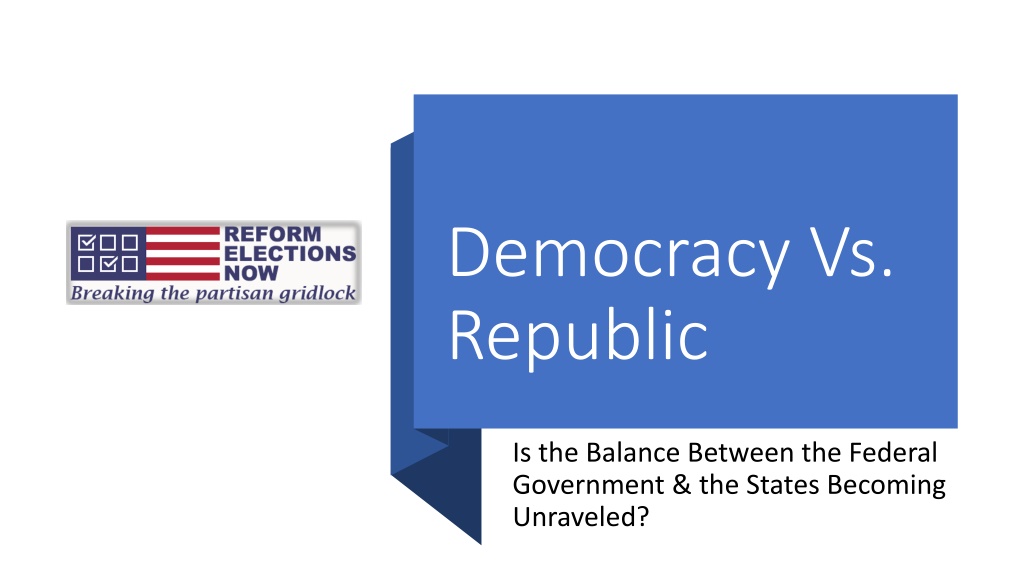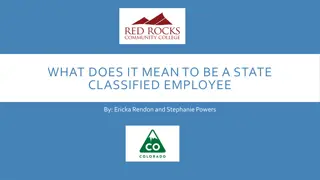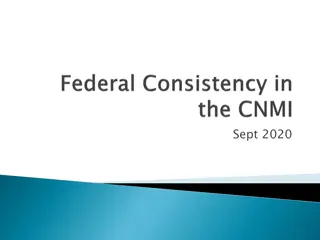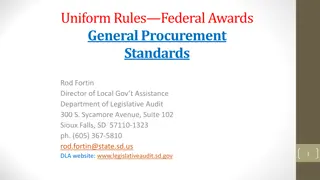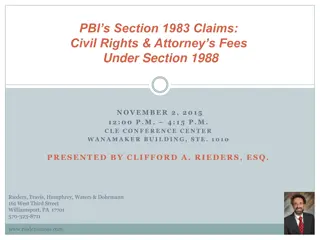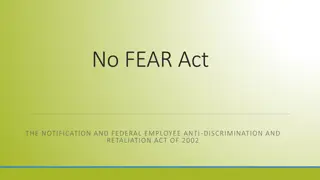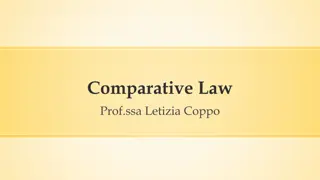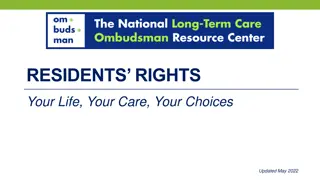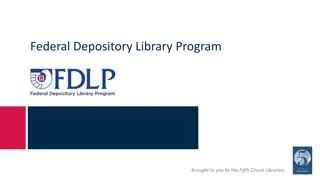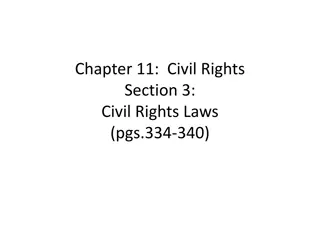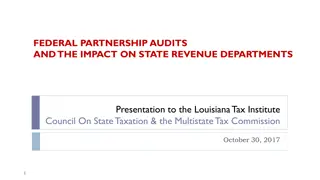The Unraveling Balance: Federal vs. State Rights in the US
The balance between the Federal Government and the States in the US, a mix of Democracy and Republic, is under scrutiny, especially with recent court decisions. This presentation explores the complex issues surrounding individual, state, and Federal rights, touching on topics like speed limits, drinking age, and the broader implications of state autonomy.
Download Presentation

Please find below an Image/Link to download the presentation.
The content on the website is provided AS IS for your information and personal use only. It may not be sold, licensed, or shared on other websites without obtaining consent from the author. Download presentation by click this link. If you encounter any issues during the download, it is possible that the publisher has removed the file from their server.
E N D
Presentation Transcript
Democracy Vs. Republic Is the Balance Between the Federal Government & the States Becoming Unraveled?
The Federal Government Vs. The States The Federal Government Vs. The States The United States is part Democracy and part Republic. The founding fathers tried to strike a balance between the rights of the Federal Government and those of the States. But now it seems as if the balance is becoming unraveled. Recent court decisions on Gerrymandering and Voting Rights have focused on what jurists term the Independent States Legislative construction of the Constitution, giving more power to the states. These rulings have been hailed by the Right and sent the Left into apoplexy. The power between the Federal Government and the states is being tested every day in many different ways. Just look at the undocumented immigrants being transported from Red states to Blue. Adjudicating the balance between states, Federal, and individual rights is a highly complex problem, which is not Republican or Democratic, and which may have more middle ground than either side would dare to admit.
Balance Between Federal, State, and Individual Balance Between Federal, State, and Individual Rights Rights In this presentation, we will consider the balance between these rights. This presentation is about you and your views. We will be asking questions on specific issues related to Federal V. States rights. You will vote, and any conclusions will be based on what you- not what we- say. You will have less than 10 seconds to answer each question, so please vote quickly. The questions will cover personal rights, marriage, guns, abortion, immigration, and election rules. Get ready to answer.
Part 1: Laws Relating to Individuals Part 1: Laws Relating to Individuals Speed Limits on Interstate Highways Speed Limits on Interstate Highways Idaho, Montana, Nevada, Oklahoma, South Dakota, Utah, & Wyoming have speed limits up to 80. Texas has speed limits up to 85. Alaska, Connecticut, Delaware, Massachusetts, New Jersey, New York, Rhode Island, and Vermont have maximum speed limits of 65. In Hawaii, it is 60. Who should determine speed limits on interstate highways? Federal State
Drinking Age Drinking Age Who should determine drinking ages in each state? Federal States This is actually a trick question. While there is no national law on drinking age, every state has a drinking age of 21. How can they agree on drinking age when they agree on nothing else? In 1984, Congress passed the National Minimum Drinking Age Act. States did not have to abide by this law, but if they did not, they would not receive Federal highway funding. Given a choice, states took the money. Could this funding model be used for other issues like abortion or same sex marriage?
Exceptions to Drinking Age Exceptions to Drinking Age Although all states chose to accept the National Drinking Age Act, most found some loopholes. 29 States allow drinking at home if parents say it is OK. 10 states allow drinking if minors are out to a meal with parents. 11 states say allow Hospitality students to drink in school. 24 states prohibit a minor from drinking in Church or at a Seder. Is banning a teenager from drinking in Church or at a Seder a violation of the First Amendment Freedom of Religion? YES No
Marriage Laws Marriage Laws Most states set the marriage age at 18, but a few have different ages. With parental consent, some states allow marriage at 16 or 17. Mississippi allows females to marry at 15, while Maryland allows females to marry at 15 if they are pregnant or have given birth. Who should decide marriage age? Federal States Individuals 20 states or territories have rules permitting people to marry their first cousins. Should marrying a first cousin be legal? Yes No Extra question- Are the states that allow cousins to marry predominantly Democratic Republican
States Where First Cousins Can Marry Blue Virginia Vermont Rhode Island New York New Mexico New Jersey Massachusetts Maryland Hawaii Connecticut Colorado California Washington D.C. Red Tennessee South Carolina Alabama Alaska Purple North Carolina Georgia Florida First Cousins over 50 Arizona Illinois Indiana Utah Wisconsin
Same Same- -Sex Marriage Sex Marriage In 2015, the Supreme Court ruled that the fundamental right to marry is guaranteed to same-sex couples by the Due Process and Equal Protection Clauses of the 14th Amendment. Yet 29 states still have constitutions that still ban same sex marriage. Who should decide rules for same-sex marriage? Federal States Individuals
Interracial Marriage Interracial Marriage Loving V. Virginia protected interracial marriage. Should there be a legal distinction between same sex and Interracial marriage? Yes No If the Supreme Court overturns Loving V. Virginia, would Clarence Thomas still be married to Ginny? Yes No Would he be happier? Yes No You don t have to answer these last two questions, as Thomas vote will make it obvious.
Polygamy Polygamy If the argument for same sex and interracial marriage is that the government should not interfere with a person s personal choices. Assume that two brothers live on a farm. One dies, and the other offers to assume responsibility for the brother s wife and their children, and both women approve. Should the husband be able to marry his brother s wife? Shouldn t polygamy also be protected by the 14thAmendment? Yes No
Moving Between States Moving Between States A 15-year-old gives birth to a child in Maryland, weds the child s father, and moves to Pennsylvania, where minors cannot marry. 60-year-old first cousins, who were married in New Mexico, move to Texas, where cousins cannot marry. Should these marriages be legal in the new state? Yes No
Guns Guns The 2ndAmendment protects the right of the people to keep and bear Arms. But states have very different gun laws relating to the age of the buyers; waiting time, purchase requirements, permits for concealed carry, open carry, and campus carry; licensing of dealers, and regulations on assault weapons. An 18-year-old New Hampshire resident brings an assault weapon to her freshman dorm at Harvard, where assault weapons are illegal. Is she breaking the law? Yes No Was your answer the same as that on marriage? Did you say that bringing a marriage across state lines was legal, but bringing a gun was not?
Marijuana Marijuana- - Federal V. State Governments Federal V. State Governments Marijuana is legal in most states, but illegal Federally. Under Federal law, Federally chartered banks and credit card companies cannot do business with marijuana dispensaries, meaning dispensaries are usually paid in cash. As a result, marijuana dispensaries have the highest burglary rate of any business. According to the Wharton School of Business, one in every two cannabis dispensaries were robbed or burglarized. While in Denver, cannabis dispensaries make up 1% of local businesses but account for 10% of all business burglaries. *RegTech Consulting. June 23, 2019 Does it make sense for something to be illegal nationally but legal in specific states. Yes No If you answered no, how do you resolve this conflict? Is there a better way to handle this conflict to lower the threat of marijuana related crime?
Abortion Abortion Prior to Roe V. Wade, only 4 states allowed abortion. Now the decisions are back in the hands of the states. Should abortion be regulated by the states, the Federal government, or neither. States Federal Neither If the Federal government banned abortion, should states be able to legalize it? Yes No If Congress passed a compromise law banning abortions after 22 weeks would states have to comply? Yes No Since Congress regulates interstate commerce could it pass a law prohibiting a state from punishing a resident that crossed state lines for an abortion? Yes No
Abortion & The Constitution Abortion Abortion There is only one problem with using the Interstate Commerce Law to protect people who cross state lines for an abortion. Article IV, Section 2 of the U.S. Constitution requires that A Person charged in any State with Treason, Felony, or other Crime, who shall flee from Justice, and be found in another State, shall on Demand of the executive Authority of the State from which he fled, be delivered up, to be removed to the State having Jurisdiction of the Crime. Thus, a law to protect women traveling across state lines for an abortion would likely be struck down because it conflicts with the U.S. Constitution. .
Part 2: Immigration Part 2: Immigration Impact of Federal Laws on States Impact of Federal Laws on States The Federal Government sets the rules for immigration, but the impact of immigrants differs significantly between states. In 2015, there were 10,700,000 undocumented immigrants in the U.S. 36% were in California and Texas, while 87% were in 11 states. *Immigrationroad.com 40% of the costs of supporting undocumented immigrants were incurred by California, Texas, and New York. The bottom 24 states incurred only 5%. **worldpopulation review If the Federal government sets immigration policies, shouldn t it compensate the states for their expenses on undocumented immigrants? Yes No
Immigration Immigration- -2 2 If the Federal government does not reimburse states, should states with a higher burden from undocumented immigrants have the right to establish their own policies? Should states have the right to transport undocumented immigrants to other states, as Texas and Florida have done? Can states deny undocumented immigrants services such as medical care or education? Yes No Should States be able to return undocumented immigrants to their countries of origin? Yes No Yes No
Part 3: Election Laws Part 3: Election Laws Voting Systems Voting Systems The Constitution lays out broad rules for the election of Presidents and Members of Congress. Most states have a similar systems, but a few have created their own versions. Maine and Alaska have adopted versions of Ranked Choice Voting. Washington, California, and Louisiana have adopted top 2 non-partisan primaries for Federal Elections. Should states have the right create their own election systems for Federal offices? YES No
Electoral College Electoral College Presidential elections are decided by the Electoral College. 48 states give their votes to the winner, but Maine and Nebraska, allocate electoral votes largely by Congressional districts. Should this be allowed? Yes No What if states switched from one system to another based on political expediency? For example, in 2020, if Pennsylvania, Michigan, Georgia, Minnesota, and Arizona had switched to the system used in Maine and Nebraska, Trump would have won the election. Should this be allowed? Yes No
Drawing of Election Districts-Population There are few rules for the way states draw election districts. The U.S. Constitution requires that each district have about the same population. (* All about Redistricting: Professor Doug Spencer s Guide to Drawing the Electoral Lines) This seems simple, but things could change. Donald Trump wanted the census to count only citizens and exclude illegal immigrants, resulting in the loss of representation for many urban areas. States have discussed alternative systems for counting only voting age population or citizen voting age population. Given the current leaning of the Supreme Court, it is possible that one or more states could attempt to employ this type of system. Should states have the right to draw districts plans based on different definitions of population? Yes No
Drawing of Election Districts Drawing of Election Districts- -Discrimination Discrimination The Constitution requires that district lines cannot be drawn to harm voters based on race or ethnicity. The Voting Rights Act of 1965 was designed to combat discrimination tactics denying minorities the right to an effective vote. This act. which created majority-minority districts, nullified many state laws. In the past 60 years, the white non-Hispanic percentage of the U.S. population has dropped from 85.4% to 57.8%. Minority candidates win elections from majority-minority districts by more than twice the margin in an average district, meaning they may actually be underrepresented. In Shelby v. Holder, the Supreme Court struck down many of the provisions of the Voting Rights Act. *(All about Redistricting: Professor Doug Spencer s Guide to Drawing the Electoral Lines) Should Congress pass an amended law protecting minorities or should states have the freedom to draw their own districts? Federal States
Gerrymandering Gerrymandering In the past, Courts have rejected some of the most racially biased gerrymandering, but a current case in front of the Supreme Court, Moore V. Harper, could give states more rights to gerrymander Congressional districts for political purposes. Assuming the Supreme Court rules in favor of the independent state law doctrine, should Congress pass legislation to define rules of drawing election districts? Yes No
Independent Commissions Independent Commissions The use of independent commissions to draw election districts appears to result in less gerrymandering, more balanced elections, and more moderation. Should Congress have the right to mandate that all Congressional districts be drawn by independent commissions? Yes No Would many current members of Congress vote for a law creating commissions that could cost them their jobs? Don t answer this question. The answer is too obvious.
National Vs. State Voting Rules National Vs. State Voting Rules Should states have the right to create their own voting rules for mail-in voting, number of voting places by population, early voting periods, and other aspects of voting or should the Federal government establish uniform rules for voting across all states? Federal States Some states, like Utah, Colorado, Washington, Oregon, and Hawaii have all mail-in voting. If a Federal law created universal standards, these states would have to change their systems. Would this be beneficial? Yes No
Registration and Voter I.D.s Registration and Voter I.D.s Should the Federal government mandate that all citizens have a valid national voter I.D. card? Yes No Should the Federal government create a national voter registry to insure people do not vote in multiple states? Yes No
Oversight Voting Rules Oversight Voting Rules Should the Federal government have the power to modify voting actions by a state that it believes discriminates against a particular group of voters? Yes No Should the Federal government conduct an audit of every Federal election. Yes No Should the Federal government select the auditors or leave it up to states which might pick Cyber Ninjas? Federal States
The Supreme Court and the Independent States Legislative The Supreme Court and the Independent States Legislative Construction of the Constitutionht Voting Rules Construction of the Constitutionht Voting Rules Assume the Conservative majority on the Supreme Court essentially rules that all elections should be decided by the states. Giving the states the right to: Draw election districts, Set voting rules, Disqualify voters based on their own rules, and Allocate Electoral votes based on the will of the Governor and the State Legislature. This is in essence the Independent States Legislative construction of the Constitution, where the states, not a majority of the people rule. If the Supreme Court ruled in this manner, what would happen to our Democracy and our country? You do not have to answer this question, but you do have to think about it, because it could happen.
Conclusion Conclusion As we said at the start of this presentation, we cannot give you our conclusions until we review your answers. In many instances, there are great advantages to allowing states to develop different systems, like Ranked Choice Voting or Top 2 Primaries. In cases such as these, the states are laboratories from which other states can learn. In other cases, citizens need to be protected from a potentially extreme government in an individual state imposing draconian rules of its citizens. We will tabulate your votes and send you the results. We do know there are no simple or easy solutions to the issues of Federal, State, and individual rights. However, we believe the balance between Federal and State power will be the most significant political issue of the next decade. Now we will open the call to comments and discussion. Peter Siris Director of Research
